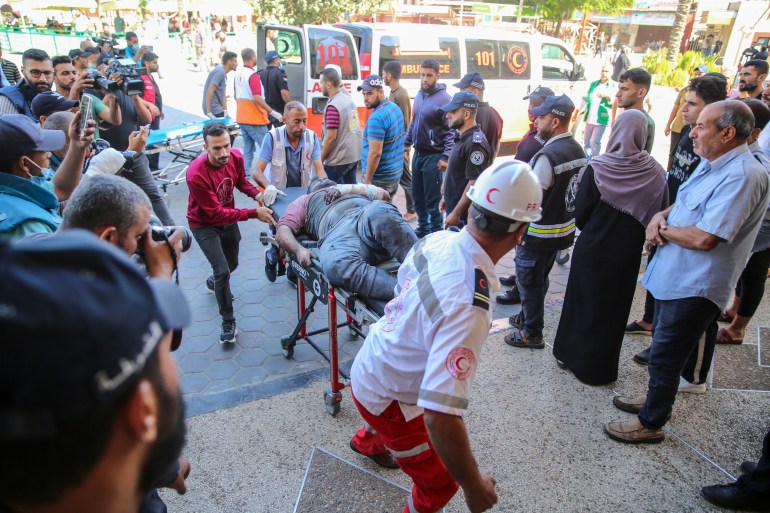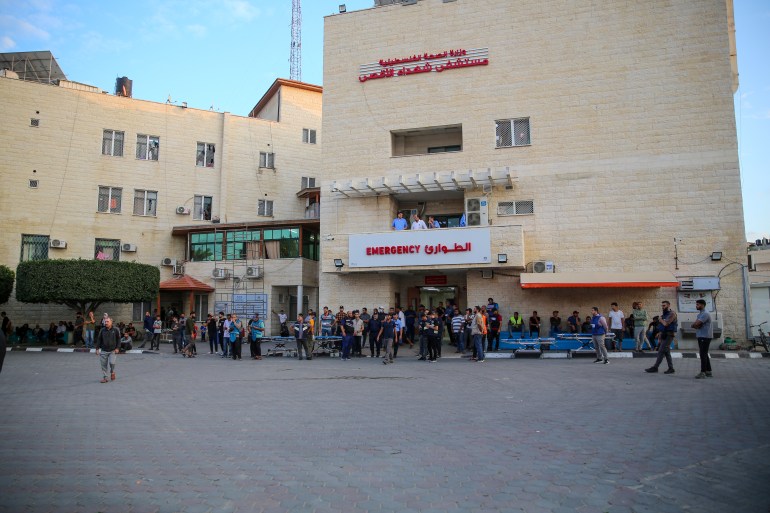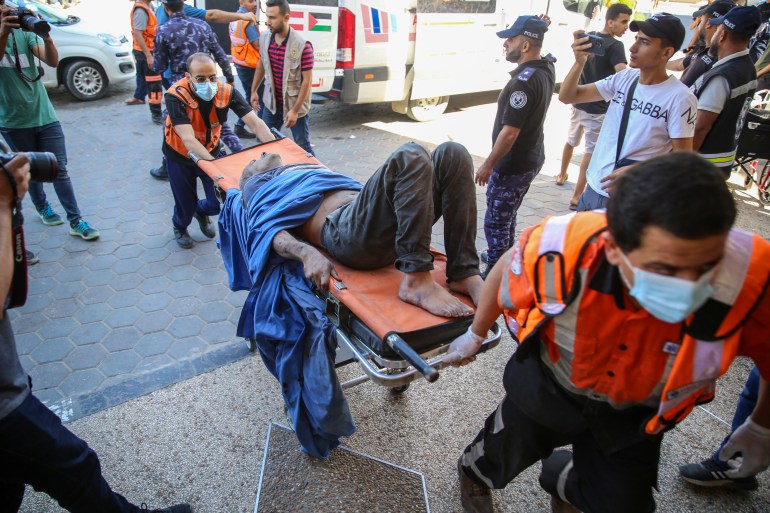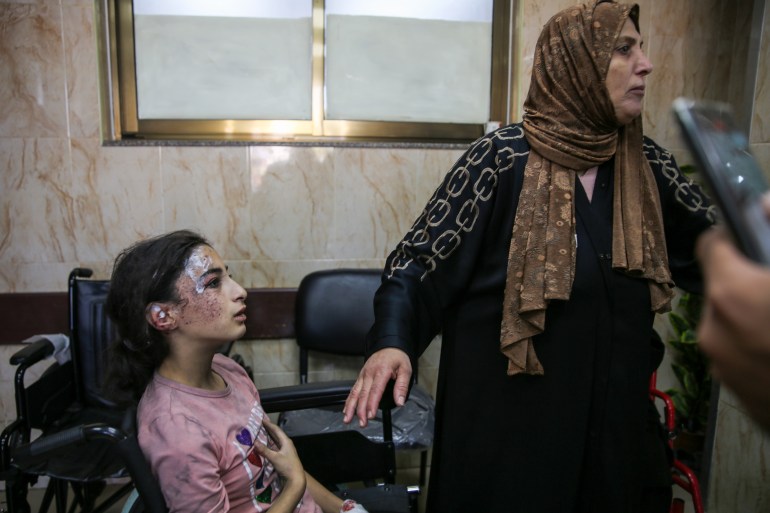“We get dozens of wounded people at a time, which is overwhelming,” he said. “All the hospital’s beds are full, so we’ve resorted to treating the injured on the floor or in the courtyard.”
Israel began bombing the besieged territory on October 7, after a surprise attack from Hamas on Israeli military bases and towns near the Strip killed 1,400.
Since then, more than 4,200 Palestinians have been killed by Israeli air attacks, and 12,000 others wounded. At least 1,524 of the dead are children, with one child being killed every 15 minutes.
Al-Degran’s family comes to see him at the hospital sometimes, but he says many other doctors and nurses have been unable to go home for days on end.
Not only are all the still operational hospitals in the Gaza Strip frantically busy, but they also have a severe shortage of medicines and supplies, and both electricity and water are scarce after Israel cut off fuel supplies that kept the power and desalination plants running.
On Thursday, the director of al-Aqsa Martyrs Hospital, Iyad al-Jabri, said the hospital’s “strategic stock of medicines and medical supplies is gone” and that there was a staff shortage.
“There is not enough equipment in the operating room or intensive care,” al-Degran said. “We have patients with serious injuries, but we cannot treat them properly.”
Patients cannot be transferred to other hospitals, because they also are also at breaking point.
Last Friday, the World Health Organization called for immediate humanitarian access, pointing out that each lost hour puts “more lives at risk”.

‘Tightening the noose on Palestinians’
Gaza has about 30 hospitals, 13 of them operated by the health ministry and others privately run.
Israel has warned 24 hospitals to evacuate, including the largest one, al-Shifa Hospital in Gaza City.
Gaza’s health ministry said four hospitals – Beit Hanoun, Hamad, Karama and Durrah – are out of service after being bombed by Israel, while 25 others have sustained damage from the bombings.
“The Israeli strikes have led to the death of 44 and the injury of 70 medical personnel,” said health ministry spokesman Ashraf al-Qudra on Thursday. He earlier said 14 health facilities had stopped operating after running out of fuel for their power generators.
“All the remaining facilities are operating at 150 percent capacity,” al-Qudra said. “As a result, we’ve been forced to carry out surgical operations on the floor. We’ve totally run of out fuel, medical supplies and medicine across all hospitals in Gaza. We are expecting the number of fatalities to rise.”
According to Dr Muhammad Zaqout, the general director of hospitals in the Gaza Strip, the facilities were already suffering a major shortage of medical supplies, amounting to 40 percent of requirements, before October 7.

“During this war, 70 percent of the medical supplies and medicines have already been consumed,” he said. “What we usually use in one month we have used in one day due to the number of cases.
“The Israeli occupation is tightening its noose on Palestinians here by closing the crossings,” Zaqout said. “Rafah is the only crossing where lifesaving medical supplies can get in,” he added, referring to the land crossing between Gaza and Egypt that Israel has bombed several times during its assault.
Defying Israeli military orders to evacuate and repeating that bombing hospitals is a crime against humanity, doctors in Gaza have taken a firm stance and refused to leave their patients behind.
“Everyone is determined that they will not evacuate,” al-Dergan said. “It’s not even possible. How can we transfer patients in intensive care or those undergoing surgery? If the Israelis want to bomb the hospitals then it will be over our heads as we stand by our patients.”
The WHO has called Israel’s evacuation orders a “death sentence” for the sick and injured.
“Overwhelmingly, caregivers have chosen to stay behind and honour their oaths as health professionals to ‘do no harm’, rather than risk moving their critically ill patients during evacuations,” the WHO said in a statement.
“Health workers should never have to make such impossible choices.”
Finding your own family among the casualties
One of the most difficult situations that doctors experience during times of crisis is discovering family members among those injured or killed.
This is what happened to Dr Fadi al-Khoudari at the al-Shifa Hospital on Monday when he found his brother and father among those killed in an Israeli attack in Gaza City.
The doctor collapsed on the floor in shock, crying out as the doctors around him tried to console him.
This scene was repeated the same day for Dr Hamid Abu Musa at Nasser Medical when he discovered that his son had been killed as the result of an Israeli warplane targeting his house west of the southern city of Khan Younis.
Zaqout, the general director of hospitals, said medical staff are close to exhaustion due to the relentless Israeli air strikes and the hundreds of casualties arriving in hospitals every day.
“The continuation of the indiscriminate bombing of the Gaza Strip will not only exhaust the medical teams, but it will also prevent them from being able to work and deal with treating the wounded,” he said.
In addition to physical exhaustion, other factors are preventing medical staff from providing care and services to the wounded, he added, such as the trauma of learning of the death of family members, the bombing of some of their homes and the displacement of their families.

‘More than we can handle’
“No doctor can bear to see the severed body parts of children,” al-Degran said. “Is it reasonable for us to have to pick up their remains in this way – a decapitated head, a severed hand … It hurts my heart very much.”
He added that he struggles when hearing the screams of injured children, men and women, shell-shocked and covered in blood, “thinking they were safe in their homes before a missile dropped over their heads”.
“What we are experiencing as doctors in hospitals is a million times more than we can handle,” al-Degran said. He called on the world to stand with Gaza and “not forsake it”.
“There is no electricity or water in the hospitals, and we rely on using generators in the operating room, intensive care and nursery, in addition to the dialysis room,” he said.
“Stop this war on Gaza, where entire families have already been wiped off the civil registry. This death and destruction is enough.”

